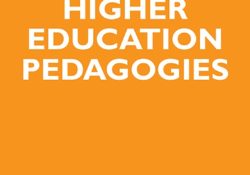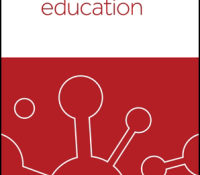tandfonline.com har udgivet en rapport under søgningen “Teacher Education Mathematics”: Abstract Formulae display:?Mathematical formulae have been encoded as MathML and are displayed in this HTML version using MathJax in order to improve their display. Uncheck the box to turn MathJax off. This feature requires Javascript. Click on a formula to zoom. Abstract Historically, the introductory course in statistics at the Norwegian University of Life Sciences (NMBU), has taken a traditional, lecture-based form. A previous study at NMBU concluded that the course structure appeared to disfavor certain cognitive or personality types, extraverts in particular. Therefore, in 2016, as an experiment, the course was restructured into a student active learning course following a flipped classroom approach. At the same time, students were encouraged to do an online screening test for cognitive preferences,… Continue Reading →
Like this:
Like Loading...

tandfonline.com har udgivet en rapport under søgningen “Teacher Education Mathematics”: ABSTRACT ABSTRACT Physics- and computer-related disciplines are strongly male dominated in Western higher education. Feminist research has demonstrated how this can be understood as reflecting a strong privileging of mind and rationality (over body/nature/emotions) in these disciplines, which harmonises with broader notions of masculinity as transcendental and disembodied. However, as we demonstrate in this paper, being recognised as legitimate in these fields is also tightly connected to embodiment. Drawing on post-structural gender theory, we explore how notions of corporeality, style and aesthetics are articulated within computer engineering and physics settings at two higher education institutions, one in Canada, one in Sweden. Using empirical data from two case studies, we demonstrate that these disciplines are usually understood as ‘gender neutral’ by… Continue Reading →
Like this:
Like Loading...

tandfonline.com har udgivet en rapport under søgningen “Teacher Education Mathematics”: ABSTRACT ABSTRACT There have been calls for Science Technology Engineering and Mathematics (STEM) education to become more interdisciplinary, reflecting the reality of contemporary research. However, communicating across disciplines is challenging. In this article, I explore what and how students read in the STEM disciplines`. I provide an overview of key topics in literacy research, and discuss the disciplinary nature of literacy. I compare disciplinary literacy requirements in STEM through thematic analysis of UK quality subject benchmark statements, which identifies considerable variation in the expectations of undergraduates to engage with primary research literature. I explore implications this has for interdisciplinary teaching, and present some published pedagogical strategies for engaging students in research literature. I call on STEM educators to embed inclusive… Continue Reading →
Like this:
Like Loading...
tandfonline.com har udgivet en rapport under søgningen “Teacher Education Mathematics”: ABSTRACT ABSTRACT Character portrayals are important to consider when investigating the effects of educational television on young viewers. When it comes to academic interests and career aspirations, children take cues from the media representations around them. This study is a content analysis of STEM-focused children’s television shows, with attention to gender and race representation amongst the characters in those programs. Across 90 episodes of programs that claim to teach STEM to young children, 1,086 unique speaking characters were coded on demographics, physical attributes, centrality to the plot, and modeling of STEM behaviors and occupations. Following traditional industry trends, female and minority characters were underrepresented in these programs compared to population statistics. However, when it came to the centrality of their… Continue Reading →
Like this:
Like Loading...
tandfonline.com har udgivet en rapport under søgningen “Teacher Education Mathematics”: Abstract Abstract When in 2014 the STEM Career Interest Survey (STEM-CIS) was developed, the researchers could check this instrument with other target audiences. Also, the question remained if the instrument was applicable for both boys and girls. This article describes the development and validation of a Dutch language version of it, called the STEM-LIT instrument, an instrument to measure the interest of children aged between ten and 12 years in Science, Technology, Engineering and Mathematics (STEM), focusing specifically on children from families with low socio-economic status (SES). The instrument has been adapted and developed in five stages and tested among Dutch primary school pupils in groups seven and eight (ages 10–11 and 11–12). The instrument was first tested in two… Continue Reading →
Like this:
Like Loading...
tandfonline.com har udgivet en rapport under søgningen “Teacher Education Mathematics”: ABSTRACT ABSTRACT This special issue brings together a mix of early-career, mid, and senior scholars to critically examine current realities of, and boldly imagine future possibilities for, STEM education in the lives of racially minoritized children in the United States. Given the implicit and sometimes explicit aspirations of STEM education to be a counteracting force against racialized injustice, how do students and communities of color experience and make sense of STEM reforms/initiatives? By examining a broad range of STEM contexts including mathematics, computer science, science and environmental science education, and through a diversity of methodological approaches, this special issue aims to contribute to a scholarly conversation about how racialized power intersects with the larger themes and foci of STEM education.… Continue Reading →
Like this:
Like Loading...
tandfonline.com har udgivet en rapport under søgningen “Teacher Education Mathematics”: ABSTRACT ABSTRACT The so-called leaking STEM pipeline (dropout in STEM education) has been the subject of many studies. The large interest of scholars in plausible causes of this leakage has resulted in a number of meta-reviews describing factors at system, school and student level related to interest and persistence in STEM education. The STEM pipeline discussion has also resulted in a large number of programmes aimed at enhancing STEM interest and persistence in STEM education. Although these programmes have been widely evaluated, there seems to be no consensus about which interventions are successful in raising interest in STEM or persistence in STEM education. This study reports the results of a systematic review of empirical studies in which the effectiveness of… Continue Reading →
Like this:
Like Loading...

tandfonline.com har udgivet en rapport under søgningen “Teacher Education Mathematics”: ABSTRACT ABSTRACT There is growing awareness of the need for mathematics and computing to quantitatively understand the complex dynamics and feedbacks in the life sciences. Although several institutions and research groups are conducting pioneering multidisciplinary research, communication and education across fields remain a bottleneck. The opportunity is ripe for using education research-supported mechanisms of cross-disciplinary training at the intersection of mathematics, computation, and biology. This case study uses the computational apprenticeship theoretical framework to describe the efforts of a computational biology lab to rapidly prototype, test, and refine a mentorship infrastructure for undergraduate research experiences. We describe the challenges, benefits, and lessons learned, as well as the utility of the computational apprenticeship framework in supporting computational/math students learning and contributing… Continue Reading →
Like this:
Like Loading...







